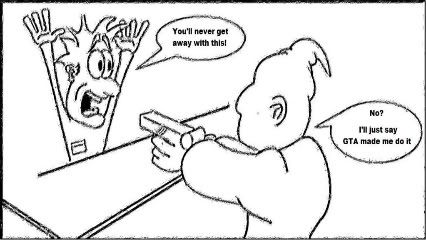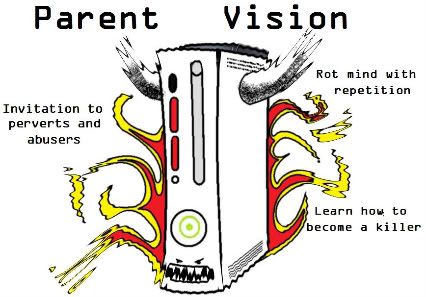
It’s axiomatic that people often fear what they do not understand. ‘Homophobia’ means fear of homosexuals of course, rather than dislike or hate of them (though fear invariably breeds aggression). Similarly, ‘Xenophobia’ means fear of foreigners. In fact, the prefix ‘xeno’ or ‘xen’ is used to indicate anything different or not fully understood. Theoretically speaking, fear of anyone or anything that you do not fully understand is xenophobia.
So it is with those that despise video games.
Now, I am not for a second suggesting that misunderstanding of the games industry is as important or worrying as racism or homophobia. That would be a ridiculously frivolous attitude to these two very important subjects. However, it is perfectly fair to say that suspicion of video games is built on similar foundations of inexperience and lack of curiosity. Almost any irrational fear or hatred is. Phobias, for instance. It is no myth that the root of many can be traced back to a specific childhood event. However, it is often simply the case that we do not understand that which we fear well enough. For example, those who have a fear of flying worry (be it consciously or subconsciously) over the seemingly impossible proposition of a gigantic chunk of metal travelling thousands of miles through the air unsupported; or they imagine that the danger of something going wrong whilst airborne to be much higher than it actually is. Very few of us understand the complex science behind heavier than air flight, but some of us worry about it more than others.
If you suffer from arachnophobia, you will almost certainly be the kind of person who kills spiders (or asks somebody to kill them for you). This is the idea of fear breeding aggression that I have already touched upon. There is, it must be said, little more alien to us that we are likely to come face to face with than a spider. So many more legs and eyes than us, an entirely different reproductive system, and even the ability to climb up walls and across ceilings. So small, as well. Three people in a living room are easy to spot; three spiders, not necessarily so. Horror stories of people dying from spider bites, too. Which ones bite? Which ones are fatal? What do the dangerous ones look like (Incidentally, all spiders bite, but almost none hard enough for a human to notice)? So much unknown. So much to fear. Better safe than sorry; strike out at them all. Guilty by association.
Video games only ever make the front pages of the popular press in a negative light. They give your children epilepsy. They turn innocent angels into bloodthirsty killers. They expose young children to entirely inappropriate content. They are undermining everything our wholesome society has built and is struggling to maintain. Newspapers wouldn’t lie to their thousands of readers about this sort of thing, would they? But which games are dangerous? Better safe than sorry; strike out at them all. Guilty by association.

Video games do not cause epilepsy, but flashing images in some can trigger fits in photosensitive epileptics (in the same way that similar images on TV or in movies, or even a series of traffic cones on a motorway, can) whether they are aware of their condition or not. The reasons for why people of any age kill are many and varied and can never, ever be put down to a single reason; certainly not down to a popular past-time that millions of law abiding citizens indulge in every single day. Video games carry age ratings to protect children from inappropriate content, that retailers are legally obliged to respect just as much as those on DVD movies. Everything in this paragraph is true, but wouldn’t sell a lot of newspapers if stuck on the front pages.
So a fear of video games, like most other fears, is built on a foundation of ignorance. Vocal opponents of video games are people who have little to no direct experience of them, which is why they are almost always middle aged or older. They base their assumptions and diatribes on what basically amounts to hearsay and rumours, without bothering to investigate the titles in question themselves. Do not make the equally prejudicial and irrational assumption that all such people are stupid, however. In the case of those who make their attacks in public, the opposite is usually the case. Attention gannets such as Keith Vaz may be given a frustratingly high soapbox to preach from, but it is their intelligence that has allowed them to reach a position where so many people will listen to them. Such people are intelligent, but not as intelligent as they may like to think; because in areas such as this they are ignorant but, crucially, unwilling to learn.
The three words ‘Grand Theft Auto’ are commonly used by those who denounce video games as evil. First and foremost, it is important to remember that each Grand Theft Auto game carries an age rating of 18. That means that it is against the law in the UK to sell a Grand Theft Auto game to anybody under the age of 18. It is for this reason that, yes, the games contain crime, drugs, prostitutes and guns. What each entry in the series also contains, that the popular press has always been strangely reluctant to talk about, is razor sharp wit and biting satire. A po – faced Grand Theft Auto game would be disturbing; but tempered with the excellent humour, anybody who takes the time to actually play one of these titles will find themselves unable to take it seriously or be in any way offended by it. Unless they are absolutely determined to be.
It is also important to remember that video games are not excreted by faceless amoral robots, but are developed over months and years by human beings like you and me with their own lives, hopes, dreams and moral standards. This means that every now and then, a video game is released with depths that those who fear them could never guess at. The two ‘Deus Ex’ titles for example tackle issues of politics, philosophy and morality head on, even forcing the player to make decisions that will affect the future of other characters in the game. The more recent game ‘Bioshock’ was developed very much with Ayn Rand’s final novel ‘Atlus Shrugged’ – which concentrates on the author’s philosophy of objectivism – in mind. A simplified explanation of objectivism would be to say that it is capitalism taken to the extreme, and this idea is apparent throughout Bioshock.

One last game I would like to mention in this context is ‘Resident Evil 4′. The influence I am about to mention here is my own supposition entirely, but I hope that you will see why I make it.
In this game, the enemy characters are ordinary people who have been infected with mind controlling parasites which operate with a hive mind mentality. The infected attack anybody not infected, and therefore different, with the intention of either killing them or adding them to the parasites’ victims. The village where the player first encounters these infected enemies is called ‘Pueblo’. The work of one Margaret Mead included a study on the Pueblo indians. She found that, in simplified terms, the Pueblos do not like people who show leadership or in any other way appear significantly independent and different from others. Everybody in their tribe must conform and behave as the rest of the tribe behaves. The use of the word ‘Pueblo’ in the game may be entirely coincidental, but I like to believe there is a good chance it is not.
A sweeping generalisation often made about video games is that they are all or nearly all violent. This is as nonsensical as saying that all or nearly all movies are romances. Many, many video games involve violence to some degree, it is true. But there are countless puzzle games, mystery games, sports games, traditional racing games, and many other non – violent genres. More ridiculous still is the suggestion, still occasionally made today, that video games are one of the main reasons behind the crime and violence to be found on our streets. This completely ignores political and social factors that actually contribute to the problem, but also seems to presuppose that violence and hedonism were almost unheard of in the days before video games.
What of violence at football matches? What of the self destructive lives of those who took punk culture to the extreme? The violent clashes between the mods and the rockers? Drug addled Victorian high society? Further back still, the hedonistic ways of the Roman empire? Has there ever been any place in the world, any time in recorded history, where violence and narcissistic crime has not been a problem? Sadly, the simple and truthful answer is no. To be capable of purely hedonistic acts is what it is to be human. How strongly we feel these urges, and how well we control them, is what defines us as individuals. This is a hard fact to face up to, that requires admitting we are not a perfect species, that not one of us is a perfect person. Much easier to blame society’s problems on rap music, or video games, or anything else that we have no interest in, and are therefore safe from being tainted by.
Much easier.
Margaret Mead’s study on the Pueblo indians is briefly mentioned by world famous novelist Aldous Huxley (grandson of world famous scientist T. H. Huxley) in one of the lectures he gave in 1959 at the University of California, Santa Barbara. Transcripts of these lectures are collected in ‘The Human Situation’ (Aldous Huxley, copyright Laura Huxley 1977). They have nothing to do with video games, but everything to do with what it means to be human. I strongly advise you to pick up a copy.
Art R. Furie; Words Luke K
















It seems unfortunate that our own ignorance is allowing us to shoot ourselves in the foot even in these circumstances. I wonder how the world would progress without the apprehensions we have about the diffrences between races? Seriously, how much more advanced would we be if it wern’t for our fear of the unknown or eachother? Brilliant read Mr.K!